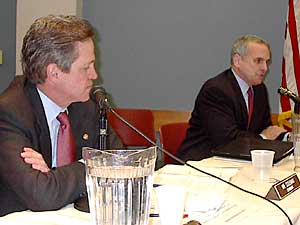|
Audio
Photos
Your Voice
|
Coleman leads Senate hearing on homeland security
May 12, 2003
 |
| Minnesota Sens. Norm Coleman and Mark Dayton heard suggestions about terrorism preparedness from several Minnesota officials. (MPR Photo/ Mark Zdechlik) |
Anoka, Minn. — President Bush is proposing increasing funding for state and local terrorism preparedness from $3 billion to $3.5 billion. Sen. Coleman, who chairs the Permanent Subcommittee on Investigations, said Congress needs to hear from people on the front lines in the nation's battle against terrorism on how that could be best spent.
"Homeland security is about security at home, It's not just about Washington security," said Coleman. "It's not just about federal government security, but security right here in Anoka, in International Falls, in Rochester, and the Twin Cities."
 | |||
Coleman, fellow Republican Sen. Susan Collins of Maine, and Minnesota's other senator, DFLer Mark Dayton, heard how since Sept. 11, local governments have struggled with dramatically increasingly security-related expenses.
Hennepin County Sheriff Pat McGowan testified that fully one-third of his time is taken up by homeland security tasks. McGowan suggested the best way to leverage homeland security funds is to create regional response teams, which could limit the cost of equipment and training.
Coleman said he liked that idea.
"In discussions that I've had with some of my colleagues, the comment has been made that not every community, for instance, needs a bomb dog," Coleman said.
McGowan said the real challenge is getting various units of government to work together.
"I think what it takes is for people to put down the turf wars -- number one," said McGowan. "I realize that we have an infinite number of requests with finite dollars, and we've got to be smart on how we use them." McGowan proposed five such regional response teams for Minnesota.
 | |||
Public Safety Commissioner Rich Stanek called Minnesota a national leader in terrorism preparedness. He urged the senators to allow more flexibility in the allocation of Homeland Security money.
"Every chief law enforcement officer and emergency manager in Minnesota is making smart and creative decisions on how to provide their services on a shoestring. A relaxation on the limitations would help all of us make better decisions for the safety of our citizens," Stanek said.
Much of the hearing focused on the challenge of securing Minnesota's international border without disrupting commerce. Officials want closer scrutiny of trains, ships and trucks as they search for things like weapons of mass destruction.
The president of the Minnesota Trucking Industry, John Hausladen, suggested officials could speed the process of truck inspections by screening trucks somewhere other than at the often congested crossings at the Minnesota-Canada border.
"Is there a way to remove some of this commercial vehicle enforcement and inspection further back from the gateway, to possibly get them through to the other side -- and do it further away? There's literally bottlenecks that commercial vehicles create, that we may want to take a look at," said Hausladen.
Coleman said he was pleased those testifying talked not only about needing more money, but also about how administrative and regulatory changes could improve efforts to better secure the nation.
|
News Headlines
|
Related Subjects
|
